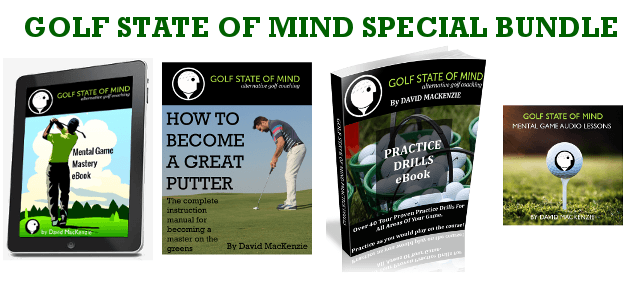The aim of mental coaching
The aim of mental game coaching is to help players gain better access to the skills they’ve developed in practice, whatever the situation.
That’s what mental toughness is all about.
It’s about getting over the ball and having a quiet, but focused, mind and a feeling of confidence in what is about to happen.
It’s trusting your swing mechanics so you don’t have to think about them.
It’s all subconscious.
Your swing becomes a reaction to what’s in front of you, not a series of technical thoughts.
That little coach inside your head is no longer needed and has disappeared.
As a mental game coach, if I can get my players into this state of mind over every shot, I’ve done a good job.
But how do you achieve this?
From my experience coaching the mental game of golf, there are 3 phases of improvement:
- Learning skills Consciously
- Learning to swing Subconsciously
- Building a strong Self Image
Learning how to achieve a better mental game is about working on the last 2 areas.
Taking your game from the range to the course
We’ve all been there.
You find something on the range and your swing just clicks.
Every ball, arrow straight or with a little draw. You’ve cracked it. Scratch golf awaits…
But on the course, that same swing is nowhere to be found.
Unfortunately, the golf course is not like the driving range.
There are consequences.
There are other players.
There’s pressure.
It’s not as easy to access that free flowing swing.
But this is where mental game training comes in.
How you access your best swings is through a good process, a blueprint if you will. Having a plan will give you more confidence right off the bat. Your “Process” is like building layers, with each one you get closer to the state of mind you need to be in at the moment you take the club away from the ball.
You need the conscious thought in order to access the subconscious control.
But what do you think about and when?
This is what’s in my blue-print for success, which you’re getting a taste of here. If you want to jump right into my program, click here.
There are 2 reasons that golfers are not able to access that “range game” on the course
- The way they practice (more simulation is needed)
- Not having a strong enough process during the round to access the Golf State of Mind
The phases of a round of golf
- Pre-round
- Pre-shot
- Shot
- Post-Shot
- In between shots
Pre-round
What goals are being set here? Are you getting technical, thinking about what score you want to shoot or setting high expectations? All this will affect how well you are able to access your best swings on the course. At this time we need to be building the foundation for success by setting the right (process) goals for the round and adopting a good attitude.
Pre-shot
Do you have a consistent pre-shot routine and is it designed to get you feeling as confident as possible when you’re over the ball. Or are you allowing negative thoughts to creep which affect your confidence?
Where your focus is before a golf shot determines how much conscious interference there is during your swing and how free flowing the movement is.
The shot itself
What’s happening in your mind during the shot?
Is there any conscious thought going on like where not to hit it or thinking about your swing? Or is your mind quiet and confident, like it was when you were hitting those lasers on the range?
Post shot
Are you able to accept the outcome of shots quickly? After a shot we need to get back into the present as quickly as possible. Too many golfers hang on to bad shots and try to figure out the mechanics of what went wrong, get frustrated and increase tension ahead of the next shot. A trigger is needed to switch off your golf brain.
In between shots
This is a crucial time. How good you are at staying the present and not putting your focus into the past or future? How regular is your nutrition and fluid intake?
Let’s work on being present during this time, as the present is an “emotionally-neutral” space.
The past or future typically have emotions attached to them which will affect your mood and raise your heart rate, affecting your ability to access your best swings.
Unless you have powerful techniques stay present, it will be challenging to do so.
Improving self image
If you don’t truly believe you are capable of becoming a better player, it will be hard to so. If you don’t already have ways that you improve your self image, then you need to work on this. A success log and daily goal setting is a good place to start.
Thanks for reading this lesson. Figuring out what your blue-print for success looks like is the place to start with improving your mental game. I’d like to help you with this. Until Sunday I’m opening up spots on my mental game coaching program. You can register using the link below:

